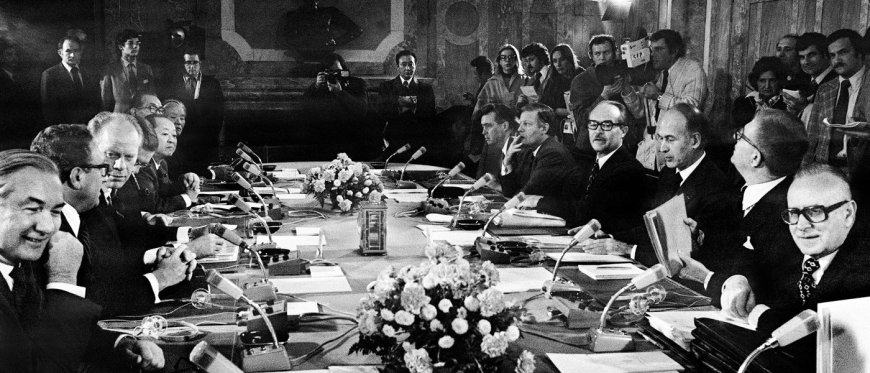A reimagined G7

OUR traditional institutions of global governance are floundering. The UN Security Council is stymied by Russian and Chinese vetoes.
The G20 and World Trade Organization (now up to 160 members) are paralyzed by a lack of consensus.
Meanwhile, two bloody wars in Ukraine and Gaza, cohesion among a bloc of autocratic powers, and the renewal of Cold War–like geopolitical rivalries with China have precipitated a world in crisis. At the same time, profound advances in the use of artificial intelligence, synthetic biology, resilient supply chains, and clean development demand new standards and norms, as well as sustained cooperative action.
The G7 leaders must converge in Italy this week with the recognition that their grouping remains the only viable institution of global governance going forward. The G7 must transform from an old boys’ club of financiers chatting about monetary policy to a coalition of action-oriented, like-minded partners inspired to sustain the rules-based international order by addressing issues ranging from Ukraine to digital security. To do this, G7 leaders must consider serious reforms that enhance the group’s capabilities, effectiveness, and legitimacy.
The G7, now composed of the advanced industrialized economies of Canada, France, Germany, Italy, Japan, the United Kingdom, the United States, and the European Union, started out in 1975 to coordinate economic policy in the wake of the oil shocks.
Over time, changes in the international environment led to changes in membership (Russia was added in 1998 and then dropped 16 years later) but also pushed the members to expand the scope of their perceived responsibilities. While no G7 declaration carries the compliant force of a UN Security Council resolution, agreements by G7 members to devote resources to a particular issue have had the effect of setting standards and norms globally.
Japan’s hosting of the G7 in 2023 was a turning point of sorts. There, the leaders identified cooperation on eight global issues that evinced an aspiration for the group to become the preeminent institution of global governance: the future of the Indo-Pacific, supply chains and economic security, food security, digital security, climate change, sustainable development, labor standards, and the future of Ukraine.
The G7 is currently not equipped with either the capabilities or the organization to carry out this mission of global governance. In the 1990s, the G8 represented 67 percent of world GDP, whereas today it is only 43 percent. Moreover, key players on issues like emerging technology, global health science, and critical mineral supply chains sit outside the group. The world benefits from a G7 fit for purpose, but the grouping badly needs an upgrade.
First, the G7 needs an infusion of new players. Australia and South Korea should be at the front of the line. These two countries offer the combination of trustworthiness and effectiveness that G7 leaders prize as the hallmark of their group. Both are advanced industrialized democracies that have fought with the free world in every war since the Korean War. Adding the two would diversify the traditionally heavy European bias in the group and include more views from Asia, the entirety of which is currently represented by one member, Japan.
Most important, these countries bring capabilities badly needed by the G7 given its ambitious agenda. A new CSIS study finds that of the nine priority global issues identified at the 2023 Hiroshima summit, South Korea and Australia, the 12th- and 13th-largest economies in the world, are ranked higher in terms of overall performance on these issues than several current G7 members (based on 300-plus publicly available performance metrics).
On digital security, for example, Australia and South Korea are outperforming France, Japan, and Italy. On economic resilience and economic security, Australia’s performance is ranked higher than all G7 members except three (the United States, the United Kingdom, and Germany).
G7 sherpas may fret that enlarging the group will hurt effectiveness. One additional membership revision would be to consolidate the two European Council and European Commission seats into one in order to keep the numbers manageable and allow for inclusion of non-European members.
Membership is not the only problem. The G7 needs better structure in order to keep sustained focus on key global issues. G7 leaders currently value the informality of the group and defer on the agenda to the year’s host.
For example, last year’s summit saw host Japan prioritize the Indo-Pacific, economic security, and supply chain resilience. But this year’s host, Italy, has shifted the agenda to a parochial issue, migration from North Africa. While all issues are important, what is needed is a consistent, consensus-based agenda, driven by a troika of the current, past, and upcoming years’ G7 hosts, to ensure sustained attention and follow-through on critical global issues.
The so-called Global South, middle economies, and nondemocratic states may find little appeal in this reimagined G7 as they are still excluded from it. At the same time, we can’t address this criticism by letting the G7 become the G20. Instead, it will be important to set up formal consultation mechanisms with these constituencies to maintain legitimacy and effectiveness as a global governance institution. This should include annual pre- and post-G7 summit consultations by the host country’s foreign and finance ministers with the African Union, the Asia-Pacific Economic Cooperation forum, the Association of Southeast Asian Nations, China, the G20, and the Organisation of Islamic Cooperation.
Many G7 gurus might reject these reforms because they covet the exclusivity of their grouping. It’s a place where leaders can have candid, unscripted conversations, and then have their countries act on those discussions. But this is not your grandfather’s G7 anymore. The disorder in the world and the vacuum of global governance institutions mandate the G7 to step up. Otherwise, that vacuum will eventually be filled by predatory actors interested in fomenting chaos or building an illiberal order.
By Victor Cha and John J. Hamre - Centre for Strategic and International Studies (CSIS)
